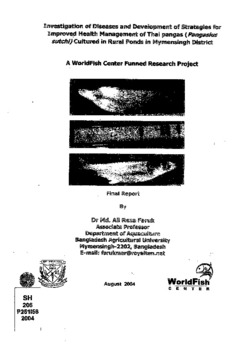Investigation of diseases and development of strategies for improved health management of Thai pangas (Pangasius sutchi) cultured in rural ponds in Mymensingh district
Abstract
Thai pangas, Pangasius sutchi (Syn. P. hypophthahnus) is one of the important species in aquaculture of Bangladesh. Over the last few years, spectacular development of has been taken place in Thai pangas farming in Mymensingh district. Due to quick profit, peoples are converting their rice field into pangas farm. However, when the expansion of pangas farming is almost in its peak, farmers are facing serious disease problems and mortality in their fish. Therefore, to examine health and disease status of Thai pangas, clinical histopathological and bacteriological techniques were employed. In addition, to assess the financial losses of farmer due to fish disease, questionnaire interview and participatory rural appraisal (PRA) tools were used with selected farmers. A total of 100 fish farmers were interviewed and several PRA sessions were conducted in three upazilas in Mymensingh districts. This study indicated that there are economic losses of approximately 3.6% to farmers from diseases. These losses varied among the different farm categories. The most prevalent disease or clinical signs as reported by the farmers was red spot, followed by anal protrusion, tail and fin rot, pop eye, dropsy and gill rot. Other conditions like cotton wool type lesion, ulceration and white spot were reported but with lower incidence

